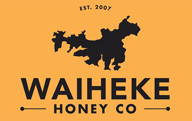About Bees
Because everyone wants to know a little more about these amazing creatures, where they live, how we look after them, and how they reward us with pots of golden honey, we’ll be using this page (as time permits) to add information about bees.
- What can I do to help bees?
- A great way is to support your local honey produces. Another is to think about any chemical products you use in your garden (read the labels for bee toxicity). You can also plant bee friendly flowering plants, and could even consider a having bumble bee house.
- I would like to keep bees. How do I start?
- Join a bee club, get yourself registered (as someone with bees), and get educated about how to raise health bees. It’s also very important to know how to recognise bee diseases. You will need time and energy to educate yourself how to keep your bees alive and healthy, and some resilience for when it goes a little pear shaped.
- I live on Waiheke Island, and would like you to keep bees on my property.
- That’s great. What we look for is: somewhere we can keep an apiary of 5 to 10 hives. Running hives organically means we need to visit regularly to check on the bees, so we need good drive-on access to the apiary site. Honey supers can be up to 40kgs each, so it’s important we have just a quick lift to the back of the ute. If you think your property can accommodate these basic requirements, please reach out and give us a call.
Is your honey “organic”?
As a small family-run business who only produces a few Tonne of honey each year, we have not gone to the trouble (and huge expense) of obtaining yearly organic certification for our products. We consider them non-certified organic. This helps keep the cost of our products down, and allows us to focus on what’s most important to us—keeping happy, healthy bees producing high quality, raw, pure New Zealand honey. We raise our bees using natural organic treatments for varroa mites. We don’t use antibiotics, which thankfully are not legal in NZ. Our bees, like New Zealand bees in general, are very healthy. Our honey supers (the boxes they live within) are made from heat treated wood, so it is not tantalised or paraffin wax dipped. Best of all our bees get to forage in a beautiful natural environment with a great variety of pollen and nectar sources to give them a balanced diet. The main agriculture on Waiheke is vineyards & olive groves that provide diverse grassland foraging for bees and are not big users of insecticides. Mostly our bees are foraging in natural (non-horticultural) areas like native New Zealand bush, and natural Manuka and Kānuka forests. Waiheke is a great place to be a bee.

